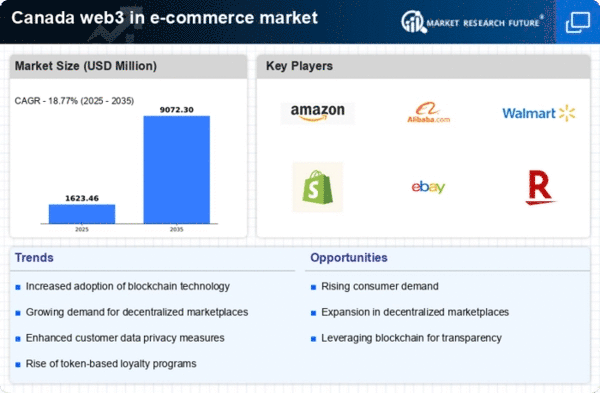Integration of Smart Contracts
Smart contracts are revolutionizing the web3 in-e-commerce-retail market by automating transactions and ensuring compliance without the need for intermediaries. In Canada, businesses are increasingly leveraging smart contracts to streamline operations, reduce costs, and enhance security. A recent survey indicates that 60% of Canadian retailers are exploring smart contract technology to improve their supply chain management. This integration not only minimizes the risk of fraud but also accelerates transaction times, which is crucial in a fast-paced retail environment. As more retailers adopt this technology, the web3 in-e-commerce-retail market is expected to witness significant growth.
Consumer Demand for Transparency
There is a growing consumer demand for transparency in the web3 in-e-commerce-retail market, driven by a desire for ethical and sustainable shopping practices. Canadian consumers are increasingly seeking brands that provide clear information about product sourcing, pricing, and environmental impact. A study shows that 70% of Canadian shoppers are willing to pay a premium for products from transparent brands. This trend is prompting retailers to adopt blockchain technology to provide verifiable information about their products. As transparency becomes a key differentiator, businesses that embrace this demand may gain a competitive edge in the web3 in-e-commerce-retail market.
Focus on Enhanced User Experience
Enhancing user experience is becoming a pivotal driver in the web3 in-e-commerce-retail market, as businesses strive to meet the evolving expectations of consumers. In Canada, retailers are increasingly investing in user-friendly interfaces, personalized shopping experiences, and seamless navigation across platforms. A report indicates that 80% of Canadian consumers prioritize ease of use when shopping online. This focus on user experience not only boosts customer satisfaction but also encourages repeat purchases. As competition intensifies, retailers that prioritize user experience may find themselves better positioned to thrive in the dynamic web3 in-e-commerce-retail market.
Rise of Decentralized Marketplaces
The emergence of decentralized marketplaces is reshaping the web3 in-e-commerce-retail market. These platforms enable peer-to-peer transactions without intermediaries, fostering a more direct relationship between buyers and sellers. In Canada, the adoption of decentralized marketplaces has surged, with a reported increase of 35% in user engagement over the past year. This shift not only reduces transaction fees but also enhances transparency, as blockchain technology records every transaction. As consumers become more aware of the benefits of decentralized systems, the demand for such marketplaces is likely to grow, potentially leading to a more competitive landscape in the web3 in-e-commerce-retail market.
Adoption of Cryptocurrency Payments
The adoption of cryptocurrency payments is gaining traction in the web3 in-e-commerce-retail market, as more Canadian consumers and businesses recognize the benefits of digital currencies. Recent data indicates that approximately 25% of Canadian retailers now accept cryptocurrencies as a payment method, reflecting a growing acceptance of this payment form. This shift not only caters to tech-savvy consumers but also offers lower transaction fees compared to traditional payment methods. As the infrastructure for cryptocurrency transactions continues to improve, the web3 in-e-commerce-retail market is likely to expand, attracting a broader customer base.
















